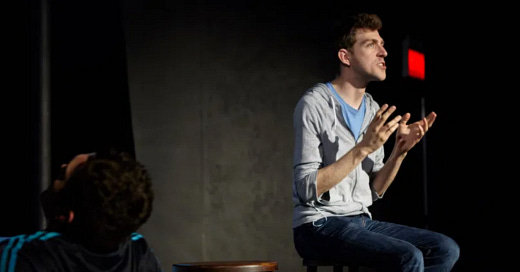OUT OF THE BLUE—Does the Russian Drama Translate?
Adam Zaininger and Will Burdin. Photo: John Jennings.
The Russian word goluboi—or light-blue—entered the gay slang lexicon because of the light-blue shirts gay men would wear to recognize one another when cruising in a homophobic post-Soviet Russia. A year after its controversial Russian premiere, Organic Theater brings OUT OF THE BLUE to American audiences, the title serving a dual purpose: to recognize the troubles of the gay community when outside of their element and to speak of the struggles of a comrade family when their son drops his goluboi bomb.
Coming out to your parents is a common topic in gay drama. If given sincere performances or an innovative lens, it can prove to be powerful storytelling and relevant societal reflection. OUT OF THE BLUE doesn’t quite hit its mark. Although some of the supporting cast in this production were having fun, the moments meant for dramatic highs often rang hollow and ultimately failed to move. A monologue delivered on a hospital bed in a psychiatric institution (the final attempt at “curing” the protagonist) had a similar tone to a Facebook rant wafting with privilege. Arguments were made that were clean and methodical and not at all like the sloppy mental breakdowns of parents convinced they were losing a son. The comedic relief was welcomed as a nice respite from the repetitive yelling, however, it further disconnected us from the authenticity of the subject matter. Whether it was an acting choice or a directing choice, a babushka paraded the stage as if straight out of The Hamptons spraying a sitcom-like aura over the whole production. It didn’t jive with modern Russia’s sense of military patriotism and forced nationalism where bigotry and fear not only remain, but are also multiplied by the sad admission that the fall of communism didn’t make life much better. And unlike The United States, where hate derives from religious doctrine and hides behind the skirts of the church, gay prejudice and ignorance in Russia is personal. Nobody quotes the bible, but all have agreed on the terminology: Hetero is “normal”, inferring that homo is the opposite. This widely adapted attitude makes Russians treat the LGBT community as less-than. However, in this production, removed from its cultural context, the anti-gay rhetoric is so nonchalantly offensive, it fails to offend.
The original premiere of OUT OF THE BLUE was welcomed with threats and shutdowns in its homeland, much like Terrence McNally’s Corpus Christi was in America. Such productions help start conversations and evolve the human species. Hopefully, throughout its run, this interpretation can create enough clear context for its story to contribute effectively to the current global dialogue on gay issues. Perhaps it can start with asking folks raised on that bias where the roots lie. Like they say in Russia, “Za spros ne byut v nos.”
June 6th, 2016





